- Serbia
Get to know Serbia
- Citizens
Culture and science
Health services
Pension and disability insurance
- Business
Employment
Economy
- Media
- Government
- Contact
Keep in touch
Contact form
Back
Keepin touch
Whether you have a question, comment, suggestion or any problem in the purview of the government, send us your message and we will try to respond as soon as possible. If your problem is not in our purview, we will forward your message to the relevant institution.
Q:
A:
EU confirms restoration of preferential sugar tariffs
Belgrade,
9 August 2004
Serbian Deputy Prime Minister Miroljub Labus said that the European Union has confirmed a European Commission’s decision to restore the preferential treatment for sugar imported from Serbia-Montenegro.
As of today, Serbia-Montenegrin companies can export sugar to the 25 EU member states under preferential arrangements, Labus told the Tanjug news agency, but stressed that the EU has warned its members to double check documents verifying the origin of goods imported from Serbia-Montenegro.
The European Commission will continue to monitor the efficiency of the state union’s customs service, the Deputy Prime Minister said, noting that the European Commission is particularly displeased with the efficiency of the Montenegrin customs service.
EU External Relations Commissioner Chris Patten has called on local courts and authorities to find the culprits of illegal sugar exports, Labus went on to say, adding that Serbia-Montenegro must not miss the chance to increase its sugar exports and improve the efficiency of its customs service.
He also warned that Brussels might change its decision if the state fails to establish the exact number of false sugar certificates over the next two months.
Free sugar exports are important not only for the state union’s overall exports and production, but also for its efforts to press ahead with privatisation and attract fresh investment, Labus went on to say, stressing that Serbia-Montenegro’s sugar surplus and production could allow the state union to boost its sugar exports by some $100 million.
The European Commission suspended the preferential treatment in May 2003 after the so-called “sugar affair” and requested that the state union pinpoint the culprits and improve its customs system.
The European Commission will continue to monitor the efficiency of the state union’s customs service, the Deputy Prime Minister said, noting that the European Commission is particularly displeased with the efficiency of the Montenegrin customs service.
EU External Relations Commissioner Chris Patten has called on local courts and authorities to find the culprits of illegal sugar exports, Labus went on to say, adding that Serbia-Montenegro must not miss the chance to increase its sugar exports and improve the efficiency of its customs service.
He also warned that Brussels might change its decision if the state fails to establish the exact number of false sugar certificates over the next two months.
Free sugar exports are important not only for the state union’s overall exports and production, but also for its efforts to press ahead with privatisation and attract fresh investment, Labus went on to say, stressing that Serbia-Montenegro’s sugar surplus and production could allow the state union to boost its sugar exports by some $100 million.
The European Commission suspended the preferential treatment in May 2003 after the so-called “sugar affair” and requested that the state union pinpoint the culprits and improve its customs system.
-
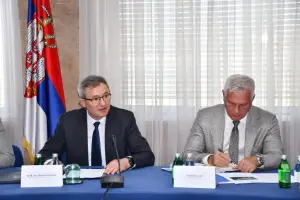 Belgrade, 27 October 2025
Belgrade, 27 October 2025Construction of Selova dam of vital importance for southeast Serbia
-
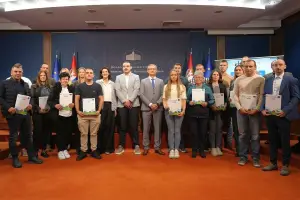 Belgrade, 22 October 2025
Belgrade, 22 October 2025First 19 resolutions awarded under IPARD III for procurement of new tractors
-
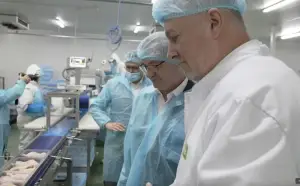 Šid, 21 October 2025
Šid, 21 October 2025Superior Foods example of successful Serbia-Hungary cooperation
-
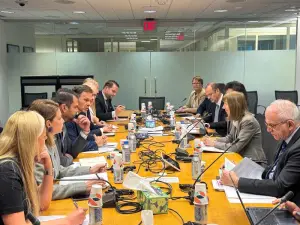 Belgrade/Washington, 17 October 2025
Belgrade/Washington, 17 October 2025Confirmation of Serbia’s position as attractive investment destination
-
 Belgrade/Washington, 16 October 2025
Belgrade/Washington, 16 October 2025Serbian economy maintains stability amid global challenges
-
 Sombor, 14 October 2025
Sombor, 14 October 2025Agriculture one of major pillars of bilateral cooperation with Italy
-
 Belgrade, 13 October 2025
Belgrade, 13 October 2025First IPARD III resolutions on support to farmers presented
-
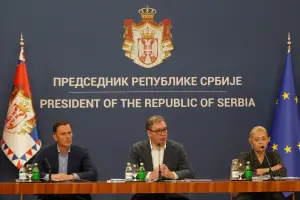 Belgrade, 21 September 2025
Belgrade, 21 September 2025Solution for legalisation of 4.8 million properties by year’s end
-
 Belgrade, 19 September 2025
Belgrade, 19 September 2025Strong potential for Italian investments in Serbia’s processing sector
-
 Belgrade, 17 September 2025
Belgrade, 17 September 2025Serbia committed to building strong economic ties with Russia


